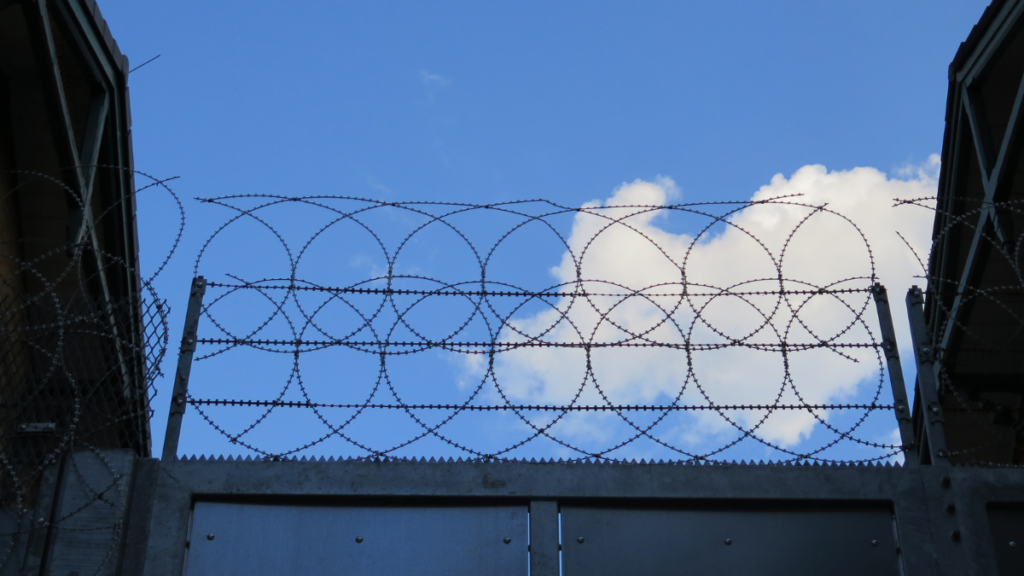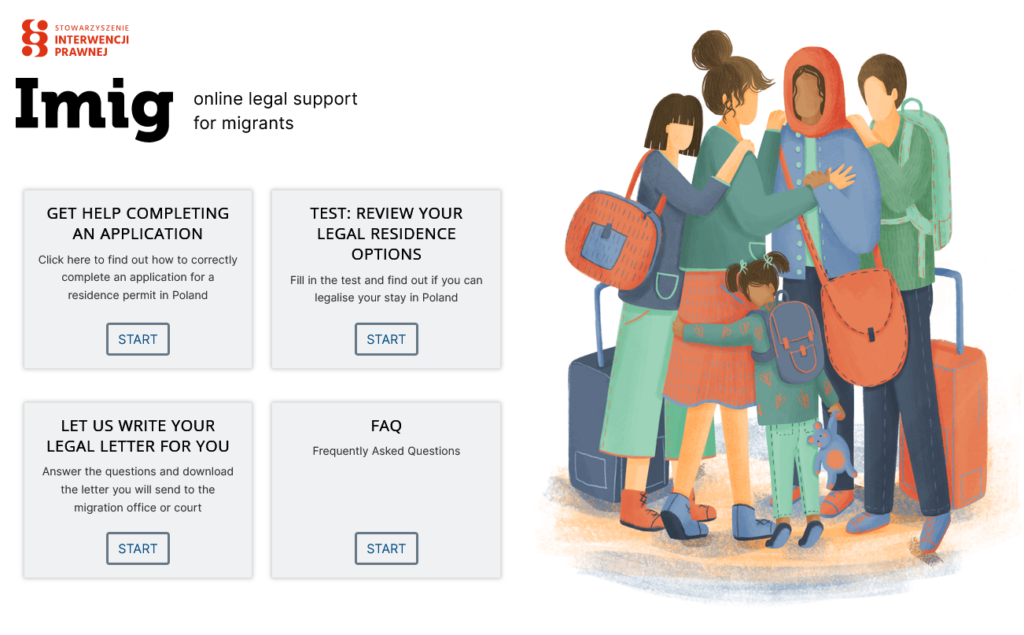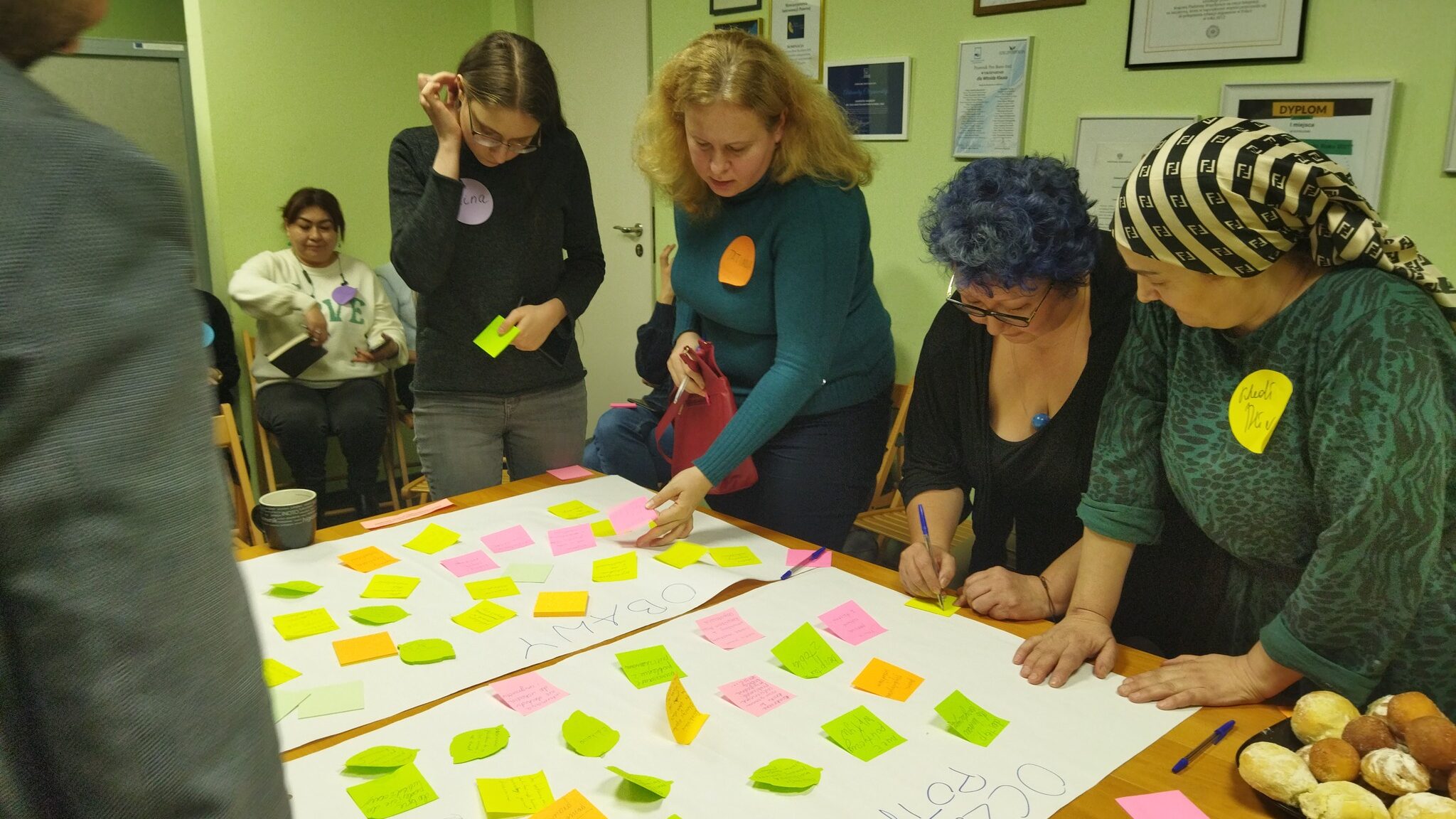The year 2023 marks the coming of age of the Association for Legal Intervention: we have been supporting people with refugee and migration experience for 18 years now. Our team currently consists of 29 employees and 25 volunteers who work every day to promote respect for the human rights of people on the move.
We have worked intensively over the past year. We provided free legal advice to more than 3,000 women and men. Several hundred of them benefited from our integration assistance. Indeed, we provided support to people in need in various places: at our office, in detention centres, reception centres, centres for refugees, courts, and public offices. We offered services face to face, by email and by phone, which enabled us to offer help to people in need from all over Poland. Hand in hand with migrants, we fought i.e. for their release from detention; granting of the refugee status, subsidiary protection, social benefits and compensations. We facilitated school enrolment of migrant children and opening of bank accounts. We actively opposed discrimination in the workplace, in access to benefits and services. We strived to monitor the constantly changing legislation and intervene whenever changes could infringe on the fundamental rights of new residents of Poland.
Below is an overview of what we have achieved in 2023 – what impact the Association for Legal Intervention has had on the lives of people with refugee and migration experience and, more generally, on the migration policies in Poland.
Thank you for believing in us and our mission – it is thanks to you that we can effectively fight for justice and respect for human rights. Enjoy your reading!
You can download the document as a pdf HERE.
Pushbacks on the Polish-Belarusian border

Pushbacks on the Polish-Belarusian border continued in 2023, while militarisation of the border area and the use of violence by uniformed services have intensified. Since 2021, at least 55 people have lost their lives on both sides of the border as a result of the anti-refugee pushback policy. Those who were ‘lucky’, arrived on the Polish territory injured, with fractures and frostbite. Even those who wanted to apply for asylum in Poland have been pushed back into the hands of Belarusian services.
In 2023, we continued to provide humanitarian assistance at the border and to conduct strategic litigation. We have successfully worked towards:
- the notification by the European Court of Human Rights of a complaint against one of the first documented pushbacks: M.M. and Others. v. Poland. The communicated case concerns a group of Yemeni and Afghan nationals who were pushed out of Poland to Belarus in August 2021, despite having made verbal asylum claims in the presence of witnesses and Border Guard officers. The Ombudsman joined the case, which is now pending before the Court.
- the judgment of the Supreme Administrative Court which confirms that the ‘border crossing protocols’ used during pushbacks do not provide sufficient guarantees that the rights of persons who are pushed back to Belarus are respected. The situation of each pushed back person must be considered on a case-by-case basis, as to whether he or she is at risk of torture or inhuman treatment.
- a joint publication with our partners of three international reports in the Protecting Rights at Border (PRAB) series, summarising the situation on the Polish-Belarusian border.
Detention and detention centres for migrants

In 2023, 2018 persons including 136 children were detained in detention centres for migrants. Last year was a record year in terms of the number of strikes that broke out in individual facilities. Two factors have increased the frustration of detained migrants, namely an increasingly difficult access to psychological assistance (in 2023 the Border Guard cut off migrants from external psychological assistance provided by independent psychologists) and insufficient access to information about the legal and factual situation of detainees (unlike in previous years, migrants currently detained in the centres do not speak the languages spoken by Border Guard officers on duty there). We are fighting, with legal tools, to improve the situation in the centres and for the detention to be used truly as a last resort measure. This year we succeeded in winning, among other things:
- A landmark Supreme Court judgment clarifying the rules of detention. The Supreme Court, in recognising our cassation appeal in a case of compensation for wrongful detention, has issued one of the most important judgments in detention cases in recent years. The judgement in the case of a single mother who, together with her young child, had been held for approximatively 16.5 months in a guarded centres clarifies requirements that should be obvious but have often been ignored by Polish courts:
- every ground for detention must be proven and courts cannot rely solely ‘on presumptions’,
- for detention to be lawful, it must be necessary in each individual case,
- detention of refugees does not have a repressive function, nor is its use intended to protect Polish borders of or the external borders of the European Union, much less to combat the phenomenon of illegal immigration,
- the primacy of the interests of the child, which is often overlooked in refugee and detention procedures, should be the overriding value.
- An important ruling of the European Court of Human Rights in the case of R.M. and others v. Poland. The ECHR ruled that Poland, by placing a mother and her three children in a detention centre for 7 months, violated their human rights: by depriving them of their liberty instead of considering less intrusive measures, and by violating their right to a fair trial by failing to respect procedural guarantees.
- Compensations for detention. SIP has been fighting against unjustified detention for several years by suing the Polish Treasury for compensations for those whose rights have been violated. We hope that having to pay specific monetary sums will influence more frequent reflection in the use of detention. In 2023, we obtained a total amount of almost PLN 170,000 for persons wrongfully placed in detention centres.
- A Supreme Court judgment in which the Court makes it clear that the mere illegal border crossing does not indicate that there is a substantial likelihood of absconding, which would automatically constitute grounds for deprivation of liberty. Furthermore, the Supreme Court agreed with us that the culpability of a migrant by leaving Poland illegally does not affect whether he or she is entitled to receive compensation for placement in a guarded centre.
- The judgement of the Provincial Administrative Court considered unlawful a worrying practice by the Border Guard – that we observed in 2023 in detention centres – of delaying the acceptance of asylum applicationsfrom persons deprived of their liberty. Postponing the acceptance of an application for protection has a major impact on the length of detention and every day of delay matters.
Support for people with migration experience
Our support is not limited to court proceedings. In various ways, we try to comprehensively support people with migration experience in regulating their legal situation, but also in building their lives in Poland. In 2023:
- We obtained a number of positive decisions and rulings for asylum seekers, including for citizens of Tajikistan (a member of an opposition party), Cameroon (an ethnically persecuted person), Republic of Congo a (person affiliated with an opposition party), Chechnya (a person opposing the Russian regime) and Kazakhstan (a journalist opposing the authorities).
In total, as many as 53 of the people that we supported this year were granted refugee status or subsidiary protection and can start a new, safe life in Poland!
- The Association’s team of caseworkers supports people waiting for their legal situation to be regularised, as well as those who have already obtained a residence/refugee status decision, in coping with the daily challenges in Poland. In 2023 we supported the integration of more than 500 people, providing special support to particularly vulnerable people, including people chronically ill, with disabilities, single parents, etc.
Full-scale war in Ukraine
Over the past year, our work with people who have fled the war in Ukraine has focused on supporting people from vulnerable groups and providing reliable, up-to-date legal information.
- We continued to provide free legal assistance to people who arrived in Poland after 24 February 2022, focusing primarily on groups most at risk of unequal treatment: people with disabilities, Roma, and people from the so-called third countries and stateless persons.
- We conducted 23 trainings for aid agencies, activists and volunteers that assist people from Ukraine.
- The legal portal for people flying Ukraine https://ukraina.interwencjaprawna.pl/en/, which we launched in 2022, just after the full-scale war began, continued to serve as a reliable resource for people fleeing the conflict and those providing assistance. We have been regularly updating the legal information on the portal, which had more than 900,000 views in 2023.
Children’s rights
Children – both those who are in the care of parents or other guardians and those who come to Poland unaccompanied – remain the most vulnerable group and are the most exposed to the negative effects of migration. SIP fights against the practice of placing children in detention centres (see above). We also contest deportations to the country of origin of children who, after a long stay in Poland, have no chance to cope with a new reality. We facilitate their access to social benefits so that they have the best possible conditions for development. At the Association, we strive to put children’s best interest and needs first.
- More than 100 cases that we conducted in 2023 concerned the rights of children, including unaccompanied minors arriving in Poland.
- In order to respond to the problem of the lack of systemic support for unaccompanied migrant children in Poland, we launched a training and mentoring project for prospective guardians of such children and for care institutions. As part of the project, we have already trained 44 people and 8 institutions. We have also created a list of well-trained legal persons ready to take on the role of guardian, to facilitate a quick and professional response in the event that an unaccompanied minor is detected on the Polish territory.
- We successfully challenged in court an opinion assessing the age of a young Somali girl based on a wrist X-ray. Determining age based on an X-ray of the wrist is an outdated examination method that does not consider differences in the physique of people from different regions of the world, and yet it is still used in Poland. The unlawful detention of a child in a guarded centre can be a consequence of an erroneous recognition of a minor as an adult. This is what happened in the case of our client, who spent 4 months of detention. We hope that the ruling will initiate jurisprudential reflection on other, more appropriate methods of age assessment.
Sharing knowledge and experience
- We have conducted more than 50 trainings for people associated with NGOs and public institutions sharing our expertise in migration law.
- We produced 9 publications: guides, reports and handbooks on topics such as support to migrant children, the legal situation of people with disabilities and alternatives to detention.
- We launched a monthly Legal Newsletter providing information on the latest rulings, publications and changes in migration and asylum law. Anyone interested in the topic can now have access to up-to-date information.

In the second half of the year, we launched IMIG, an online legal support tool for migrants, available in four languages, which contains sample letters applicable in migration proceedings. The templates can be adapted to individual needs and then printed out, to be submitted to an administration or a court. The tool also guides people legalising their stay in Poland step by step through the relevant application procedure. It is being used both by people with migration and refugee experience and by individuals and organisations supporting them. In a few months of operation, more than 40,000 users have used the tool.
Advocacy for the rights of people with migration experience
We monitor and try to influence migration policy in Poland. In the past year, we issued 11 position papers and calls, alone and with other social organisations, pointing out to decision-makers the irregularities in the implementation of the legislation in Poland and suggesting legal changes to be introduced. Notably:
- We protested, together with other organisations, against the practice of refusing persons without Ukrainian citizenship to cross the Ukrainian-Polish border. We reported cases of third-country nationals under international or subsidiary protection in Ukraine being refused entry to Poland, mainly due to a lack of documents, which they often had no way of obtaining at all.
- We intervened on the limited access of migrants to their case files in the asylum procedure.
- We protested against a national referendum that defamed people with refugee experience.
In January 2023, The Refugee Council , a community-led initiative was created within the Association. It aims to strengthen the voice, empowerment and self-determination of people with refugee experience and to represent the interests of this group at local authority level and in public spaces. In 2023, the Council has already issued 2 positions on the use of the hijab during the Wielkopolska police “Wolf-Ram-23” exercises and on the anti-refugee/migrant narrative during the Polish election campaign.

Challenges for 2024
In 2024, we will, of course, continue with what we know best: legal support for people with migration experience, whose rights have been violated. In addition to the ‘core’ issues, we also expect new challenges:
- Express return procedures. In the past year, changes to the legislation weakening the safeguards for migrants in return procedure have come into force. Notably, the time for lodging an appeal has been reduced to seven days. It will thus be particularly challenging to provide reliable, timely legal assistance to persons at risk of deportation, especially in locations far from major cities and in detention centres.
- A new migration policy. With the change of governement in October 2023, the issue of Poland’s migration policy, removed from the agenda by the previous government, is resurfacing. We will advocate for a swift start to the development of new policy, including extensive consultation with civil society and migrants themselves.
- Stopping pushbacks on the Polish-Belarusian border. The change of power has reawakened hope for an end to the brutal pushback policy, which the current rulers criticised while in opposition. At present, the situation at the border does not seem likely to improve any time soon. In this way, in 2024 we will, like other organisations, pursue our current activities: legal, advocacy and humanitarian work for people on the move.
- The future of refugees from Ukraine. Although the European Union has extended temporary protection for people fleeing Ukraine until March 2025, Polish legislation still guarantees protection only until March 2024. The coming months will show to what extent the new government wants to protect and further support Ukrainian refugees. The new government declares serious restrictions on support. We will monitor both the proposed changes and call for their swift implementation. Uncertainty about their further stay in Poland is a major barrier to the integration of Poland’s new residents.
If you would like to support us our ongoing work on behalf of people with migration and refugee experience in Poland, you can do so HERE.
Thank you!